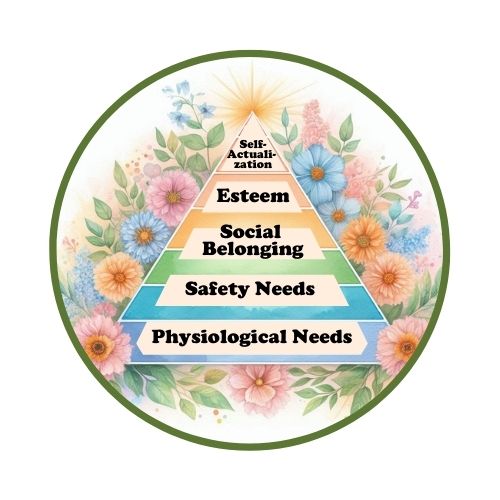Abraham Maslow (1908-1970) was one of the first American psychologists to gain international recognition and is now considered one of the great psychologists of the 20th century. Maslow is well known for what’s been called Maslow’s Hammer, relying too much on a familiar tool, or the idea that a man with only a hammer thinks everything is a nail. But his contributions to modern and popular psychiatry are much more significant. In contrast to many earlier psychologists, Maslow turned his focus away from abnormal psychology and toward health and well-being. He felt Freud and Skinner had built the framework for understanding illness and determinism or fate, but we still needed a framework for understanding health, goodness, and free will.
Today, Maslow may be best known and remembered for his book Toward a Psychology of Being. He developed the concept of a hierarchy of needs. He arranged these needs as a pyramid for illustration purposes, with four levels forming the base and a fifth level as the capstone. In Maslow’s view, the first four levels were deficiency needs—they are only important if you don’t have enough. Once those needs are met, you can move on to meeting the needs at the next level. Any deficiency in these basic needs will consume all your time and attention.
In his view, people are primarily driven by five basic needs:
Physical
The base level of the pyramid is physical or physiological needs. These include the basic human physical needs for food, water, elimination, sleep, and sex. They can also include shelter, protection from heat or cold, air, and other primary survival threats. For an addict, they may include the need for the next fix or drink. People who aren’t getting enough of these basic needs are not likely to have the bandwidth to worry about higher or less immediate needs.
This is why hunger, poverty, and homelessness are not just individual problems but societal ones. As Jean Valjean demonstrates in Victor Hugo’s Les Miserables, a starving man will not hesitate to steal a loaf of bread. The immediate hunger at the moment trumps the need for self-respect and following society’s rules (which comes at a higher level).
Safety
The next level of needs includes safety, security, order, and stability. Today’s physical threat is not the same as a threat tomorrow or next week. If you are worried about starving today, starving tomorrow is not on your radar. But if your belly is filled for the moment, food insecurity can still be your next highest concern. Security may involve feeling safe from crime, hunger, or want. It may also include having savings, a job, or a home. It may even mean living in a neighborhood where you feel safe, which is difficult if those around you are in a constant fight for survival.
Although we usually know when we have enough to eat, drink, or sleep, safety is complicated to measure, and some may never feel truly safe. Safety is the first level of deficiency needs where it becomes more difficult to measure when someone’s needs are met.
Love and Belonging
We all need love, belonging, friendship, acceptance, and, depending on our sexuality, sexual intimacy. These are purely psychological needs, so they can’t be measured economically as lower-level needs often can be. We all need family and community to feel love and acceptance. The drive for approval can be all-consuming if those needs aren’t met. People lacking in these needs may go to great lengths to present themselves as popular and impressive because they feel insecure.
Esteem
The fourth and final deficiency need is the desire for confidence, esteem, recognition, respect, and achievement; this is less about who cares for you and more about accomplishment. People need to feel they are good at something, and good for something, even if they know they are loved by their family and friends.
Now, you may not need much, and a little of the real thing may go a long way. However, it’s important to note that even competitive accomplishments may not serve this need: a world championship in one year doesn’t fill that same hole the following year. People who view the world as a zero-sum game with only winners and losers are likely to struggle with this concept. For them, another’s win must mean their loss, so they can never be truly happy for another person’s success, nor secure in their victories. What David Letterman used to say about his popular Stupid Pet Tricks is probably true of life: “This is only an exhibition, not a competition; so please—no wagering!”
Self-actualization
The real fun begins on the fifth level of the pyramid because we are no longer talking about needs and deficiencies but growth and potential! This is where cognitive, aesthetic, creative, inventive, moral, and philanthropic ideas occur. We are no longer worried about lack or deficiency of some basic need—all those needs are met, and we can focus on making the most of our finite time and talents to make the world a better place. We move from a scarcity mindset to one of abundance. This is where the real magic happens!
Like many psychologists, Maslow uses language in his own highly academic way. Some have criticized him for not being scientific enough or for not supporting his ideas with enough laboratory evidence. Still, over the years, I have found that Maslow’s hierarchy of needs has been a great help in understanding myself and others and how we relate to each other. It has helped me fill gaps in my own life, spend less time serving deficiency needs, and spend more time at the top of the pyramid. After all, that is where you can look up at the stars and envision the world as a better place. I hope you will find the concept helpful as well!









1 comment
tera
I came across Maslow in the 1980s in a college course I was taking. Connected with it right away. Have used it as a guideline in my life. :)
Leave a comment
All comments are moderated before being published.
This site is protected by hCaptcha and the hCaptcha Privacy Policy and Terms of Service apply.